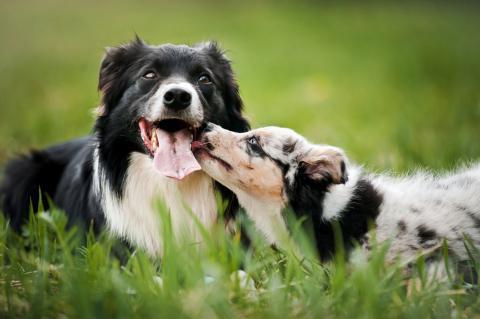
Dogs have a bit of a reputation for having stinky breath. We get it—they tend to eat a lot of gross things. And the whole lack-of-opposable-thumbs thing makes it difficult for them to brush and floss their own teeth.
Unfortunately, putrid puppy breath is often a sign of more significant health problems—it’s not just an annoying part of dog ownership, but rather something you should address. Bad breath can indicate that plaque and tartar are building up on your dog’s teeth and—just like for humans—dental bacteria and poor dental hygiene correlates to health risks like cardiovascular problems and oral cancers in canines. And since most dogs are less than enthusiastic about having their teeth professionally cleaned, a doggo dental visit typically involves anesthesia. Personally, I am less than enthusiastic about unnecessary anesthesia in my dog—so prevention is crucial for my dog’s dental health.
How To Cure Bad Dog Breath
Luckily, a lot of dogs enjoy chewing, and chewing can help minimize the buildup of bacteria on teeth. However, it’s not a cure-all. Brushing your dog’s teeth daily (yes, daily!) helps a lot. Find a toothpaste they like (London broil flavor did the trick for my dog, Hattie) and focus on just the act of putting the brush and paste in their mouth before working your way up to actual “brushing.”
And remember: If your dog has persistent bad breath that nothing seems to help, make sure to visit your vet to rule out any health problems they can help with.
1. Herbs
If your dog has a refined enough palate to enjoy fresh mint, parsley, or wheatgrass sprinkled on his food, by all means—garnish to your heart’s delight! Fresh mint and parsley will help keep your pup’s teeth clean and breath fresh—not only because they smell good themselves, but because the chlorophyll in them helps fight bacteria, too. (So that’s why those popular dog chews are dark green!) If your dog doesn’t have a taste for fresh herbs, you can try sneaking them to her in treats you buy or make. You’ll need to use about one teaspoon for every ten pounds of your dog’s body weight to notice any significant difference. You can also try cilantro or sage—see what herbs your dog prefers.
2. Probiotics
We know how important probiotics are for people when it comes to balancing healthy bacteria in the gut…so it shouldn’t surprise us that dogs benefit from probiotics too. Make sure you’re using dog-specific probiotics and introduce them to your dog slowly. Eventually, the good bacteria in your dog’s gut and gullet should outnumber the bad, and her breath—and overall health!—should improve. If you don’t want to purchase probiotics, you can try food sources too—like yogurt, kefir, and honey.)
3. Apple Cider Vinegar
Is there anything ACV can’t do? Adding just a half-teaspoon to your dog’s water dish will help combat plaque and tartar in his mouth, leading to better smelling breath. Your dog might notice the taste in his water, so monitor his water consumption after adding it to his dish and if he’s refusing to drink, try another method on this list.
4. Coconut Oil
Coconut oil is so good for your dog. It can help with allergies, improve digestion, keep skin healthy, and more. You can add it to their food or just feed it straight to them—you can even put it on a toothbrush and use it as toothpaste (don’t worry, they’ll lick it off!). Try a teaspoon of coconut oil for every ten pounds of your dog’s weight.
5. Lemon
If your dog won’t tolerate the taste of apple cider vinegar in her water dish, try lemon juice instead. It has antibacterial properties as well that will help decrease the bad bacteria in your dog’s mouth and lead to a sweeter scent.
6. Fruits & Veggies
Crunchy produce like carrots and apples can help scrub the hard-to-reach places in your pup’s mouth. Give them a few pieces for a healthy snack and that tartar and plaque will get rubbed right off the gum line and teeth. And these foods make healthy snacks for your dog, boosting the vitamin and mineral intake at the same time—a win-win!
7. Seaweed
There is lots of good stuff in seaweed that makes it an obvious choice to combat bad breath in your dog. For starters, it cuts down on the bad-breath-causing bacteria. Just make sure you don’t let your dog eat seaweed at the beach! Either get dog specific seaweed supplements or use an unseasoned seaweed snack (and check with your vet for dosage).
8. Neem
Just like neem is good for the oral health of humans, it’s good for the oral health of canines. You can add a neem supplement to their food periodically to keep their teeth in tip-top shape.








